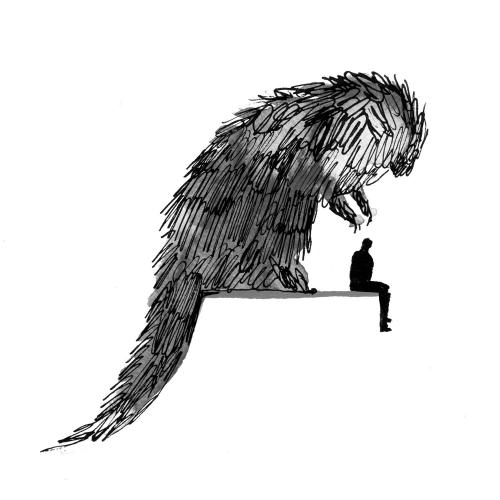
We’re a worried bunch, we Americans. We’re anxious. We’re gloomy, even doomy. We’re angsty, despairing, depressed. There’s a widespread sense that things are certainly not right with the world, and perhaps not right with us. If Dickens were with us, he might call it the most uncool of times.
How do I know that it’s not just me who’s down in the mouth? Well, take it from scholars of public-health issues, who observe that as a society we’re drinking like fish, popping downers like Jacqueline Susann characters, and killing ourselves as if at Jonestown or a Goethe seminar. Mass shootings are at an all-time high, and the number seems to be growing by leaps and bounds with each passing year. In 2017, an average of 130 Americans died every day of opioid overdose. A federal report issued in 2019 indicates that the suicide rate among young people aged ten- to twenty-four years old rose 56 percent in the decade between 2007 and 2017, while the homicide rate—which had been declining—has begun to rise again in the last few years. Given climate apocalypse, the state of affairs in Washington, and a sense that our two steps back for every one forward have gone to maybe five or six, it’s no wonder we’re collectively bummed out.
Princeton University economists Anne Case and Sir Angus Deaton recently coined the phrase “deaths of despair” to describe that epidemic, which has a disproportionate hold over men and women without high school diplomas, making them susceptible to being left behind by an increasingly technological society and to a painfully slow economic recovery. Cast the French word that comes into English as despair, and you have hopelessness, the feeling that nothing we do can change our lives for the better.
Angst, that favorite term of Danish philosopher Søren Kierkegaard, is much like that. He used it to denote an all-encompassing dread, the kind of fear that no fight-or-flight response can overcome. We tend to use angst as a synonym for depression, but then, we use depression imprecisely to refer to a low state of mind, and not, in its strict psychological sense, to mean the debilitating, sometimes near-paralytic state that surpasses mere anxiety. Depression is not a mood but an illness, as is anxiety, which in turn is the fear of some unknown or unspecified threat: Something is out to get us, and we respond by perching on the edge of a panic attack.
Those who suffer from angst, depression, or anxiety feel it in the body: They tremble, sweat, gasp for breath. Ordinary worry, in contrast, happens in the mind, and it is less generalized: You worry about a particular test that you have to take in a few days, but suffer anxiety at taking tests, period. Worry can yield solutions. Anxiety resists relief short of therapy or medication, as does depression.
No matter what dark cast of mind we’re in—despair, angst, worry, anxiety, depression—former US Surgeon General Vivek Murthy traces it to loneliness, the feeling that no one is there to help ease our emotional pain, even in a crowded room. Murthy contrasts this with solitude, which he deems a comfortable attitude toward being alone. “Solitude, paradoxically, protects against loneliness,” he writes. But that’s a fine distinction for another, and with luck happier, time.






